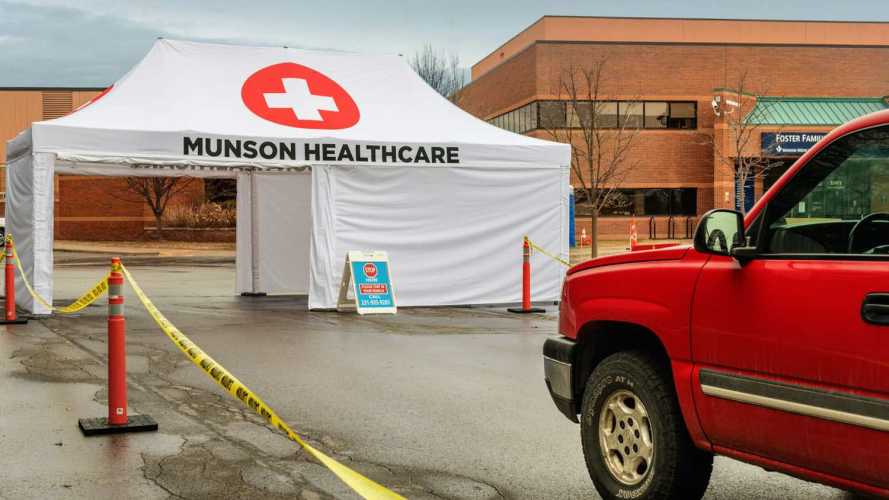Since early January, Matt Bulloch had been closely following the story of the novel coronavirus. Little did the CEO of TentCraft know that a few months later, the pandemic would hit his premium custom tent business. Hard.
One by one, its marquee clients scrapped events: South by Southwest, the film, music, and media festival in Austin, Texas and the NCAA Basketball finals in Atlanta. Along with them an estimated $600,000 in potential revenue vanished in March.
Bulloch was stressed, to say the least. He didn’t know when business would bounce back — if ever. And TentCraft didn’t have recurring revenue to tide them over until the crisis abated. But then he spotted a news story about drive-through COVID-19 testing sites in South Korea. A light bulb went off. He could do that, too, only better. He would get high-quality medical tents for healthcare workers on the frontlines to test, screen, and triage patients.
Suddenly, TentCraft had a new purpose — and a new customer base. “We said everything we’re working on needs to stop and the only thing that matters is creating new products for healthcare applications,” said Bulloch.
A pivot like this didn’t happen overnight. TentCraft adapted its supply chain to meet this new demand, and used digital technology to reach a brand new customer base. It took collaboration, agility, and the right partner to empower them in a time of uncertainty.
Use digital technology to connect the ecosystem
COVID-19 forced many manufacturers to reevaluate business models and speed up the implementation or expanded use of digital technology to operate safely and adjust to a changing world. TentCraft had been building its digital capabilities for years, creating a connected ecosystem that made it possible to align its supply chain and retool manufacturing to build solutions (that were now) specific to healthcare.
“Our entire business is built on the Salesforce platform: the front office with sales, marketing, and client services, and our ERP (enterprise resource planning),” said Luke Mason, director of Marketing Operations. Working off the same data in Sales Cloud creates a single source of truth for sales, marketing, operations, production, and executive teams. The teams see the entire sales cycle, from when a lead receives a quote to product production, and collaborate within the system. Because of this visibility, TentCraft saw an 68% increase in quote accuracy. In addition, their sales cycle decreased from 14 days to under 10 days.
TentCraft integrated Sales Cloud with Rootstock ERP. This provides visibility into ERP data, like procurement or supply chain. The complete view gave the team a deep understanding of how to pivot the business based on demand during COVID-19. TentCraft used to plan around seasonal factors, like annual events. Now, the team depends on the data sales reps enter into the system to get a clear picture of demand.
Build models anywhere
Before the health crisis, TentCraft had implemented the Lightning Platform as a way for team members to work away from the office. On top of the platform, TentCraft built a custom visualization tool for digital mock-ups of tents. Product turnaround sped up sevenfold. TentCraft now manufactures a tent from start to finish in three days versus the industry standard of three-to-six weeks.
This forward-thinking innovation made all the difference when many offices temporarily closed. The team continued to work virtually, collaborating on the digital mock-ups and adapting to the changing environment with ease. Sales reps could see where orders were in the production process while the production team could see sales trends in real time.
Reach new customers at scale
Supply is just one part of the story. The pandemic required TentCraft to quickly connect with a brand-new type of customer. Digital technology tools provided this capability too.
“Although the team was aligned in making the pivot to hospital and medical tents, we didn’t really operate within the healthcare industry, so we had no key contacts or relationships that would really give us a head start,” said Mason.
Pardot, a business-to-business (B2B) marketing automation tool, played a critical role in helping the team identify new markets and segments. They were able to increase reach, nurture leads, and build relationships with healthcare institutions.
The system assigns a numerical value to each new lead based on their level of interest (this is known as lead scoring). Qualified leads automatically route to a sales rep for further support. The marketing team then provides the most relevant content to the sales team. Reps customize and send tailored campaigns at scale to nurture relationships and close deals faster. (Learn more about how to automate B2B marketing.)
Stay agile moving forward
Their ability to pivot to a new type of customer is paying off big in a year that could have been disastrous. Beyond the improvements in quote accuracy, sales cycle time, and production time, 2020 will be a record revenue year for TentCraft.
As the pandemic continues, TentCraft is well positioned to fulfill new needs for tents and accessories. “The most exciting part of our digital transformation is that we can continue to make more pivots,” said Mason. “Our team and culture has really embraced increasing capacity without increasing overhead. Salesforce and the automation we are able to leverage plays a big role in that.”
The team plans to explore new markets. This experience has also proven to them that they can quickly make new products with a back-end operation that supports change. “The silver lining for us is that we’ve realized we have the people, the leadership, and the platform that’s really going to allow us to continue to pivot and grow,” said Mason. Learn more about how their pivot and partnership with Salesforce sets them up for future success.
Digital technology is no longer an option for manufacturers. It’s an imperative to stay relevant today and ready for whatever the future holds. For more information on how Salesforce can help your business stay agile and scale for an immediate impact, discover our solutions for Manufacturing and Manufacturing Cloud.





























